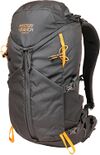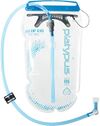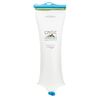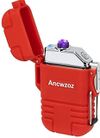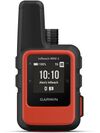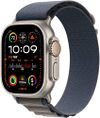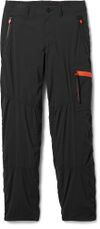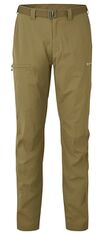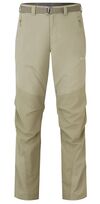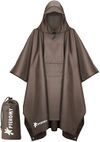Hiking Gear
Here is a listing of the gear I've bought, and at least until now, what I think of it.
Equipment
Backpack
I picked up the Mystery Ranch model Coulee 20 in Black (small/medium). It is adjustable, which is good, as I'm short-torsoed, this pack fits great.
They don't say on the website description, but in the comments Mystery Ranch says to assume about 1 lbs per liter of capacity as the weight carrying limit for a back. That's good to know, as I'd tried to stuff 40 lbs into this pack, and scuffed up the hydration bladder pocket, and found it kind of uncomfortable, so now I don't go above 30 lbs. The first time I put weight in this, versus my last pack (which was a glorified school book bag), it was like being hugged by a cloud... very nice.
This is pretty small for overnighting, but should be great for day hiking, and the [[1]], for which I'll just have a bunch of water, a bit of food, and emergency gear. I really like the full-length center zipper and top pocket. I'm using the top pocket for my headlamp, medical supplies (toe tape, analgesics, and allergy relief) and emergency tools (knife, mylar blanket, signal mirror, whistle, etc.). I will also through my beanie and light gloves up here. For Rim2Rim I'll probably through some Kind bars and goo gel packs up here, as well as LMNT hydration packets.
In the main pouch I have both the 2 and 3 liter Platypus hydration bladders so I can drink on the go. For the Rim2Rim, I'll carry a scrunched up puffer jacket, rain jacket/poncho, spare socks, mid layer, heavy gloves.
To go in the pack, I got both the 2 L and 3 L Playpus Big Zip Evo (Taste-Free) Hydration Bladder. The 2L fits nicely, but the 3L will fit, and that will be nice for the Rim2Rim where we'll be out all day.
Head Lamp
I went with a Nite Ize Radiant RH1 PowerSwitch LED rechargeable headlamp. I liked this because it's a high-power LED, so it uses relatively little power for the amount of light it throws out, but it can also be powered by 3 AAA alkaline batteries (or a spare Lithium Ion battery).
Pack weights
I've been rucking for several weeks now to improve my overall fitness and weight-bearing capacity (which hopefully will maintain my bone density while I drop fat off of my body). I'm working to keep my pace up, or get it back close to my no-weight pace, and so now when I hike without weight in there I feel like I'm floating.
I bought 5 of these Yes4All 10 lbs platespla with straps to cinch them together so they don't carreen back and forth separately in my pack.
Water Purification
I kind of went belt-and-suspenders on water purification. My mainline go-to for drinking water will be the Grayl UltraPress 16.9 oz Water Purifier, because it has a carbon filter in it, and therefore will get rid of the nasty bugs and pathogens as well as sediment, chemicals, and pesticides. Much of that won't be needed for the Rim2Rim, and I'll probably just use the Sawyer below for that, but for pond water, and likely most rivers in the future I'll bring this in one of my side pouches to make potable water.
On top of this, I got the Sawyer SP129 Squeeze filter, which does bacteria and protozoa, and microplastics, but not chemicals, pesticides, heavy metals or viruses.
I have a cnoc bag and several different attachments that I picked up to use Smart Water bottles as the dirty and clean sides of the filter, or alternatively cnoc bags (depending on the depth and flow of the source of water one or the other might be impractical), as well as a millbank bag that I picked up to 'prefilter' sediment before sending it through the Sawyer, and hopefully elongate it's lifespan.
The various hose connections I picked up allow me to filter water directly into my hydration bladder without taking it out of my pack, which should be a nice feature on-trail. In addition, I picked up the a LifeStraw for emergency use, and a SterPen that I can use with the Sawyer filter to kill bacteria and viruses in a pinch.
My general plan will be to have 2 or 3 liters of water in my pack, and then 1 or 2 16.9 oz SmartWater bottles with electrolytes in my side pouches (with or without sugar/carbs depending on the duration of the hike) to make sure I don't go hyponatremic. I like the citrus and orange LMNT flavors, which have only fake sugars as my base electrolyte.
Trekking Poles
I went with the Fizan Compact 3 Trekking Poles from Italy, 5.6 oz with cork hand grips and rotating friction locks. I don't like the idea of the lever locks for if/when I try to stow them in my pack, so I like this form better. They're 7001 aluminum, which makes them strong and light, and bit less likely to break than carbon fiber.
First Aid Kit
I went with the standard recommendation for the Ultralight/Watertight Medical Kit - .5, which has the basics (band aids, gauze, cleaning and antiseptic wipes, moleskin, basic pain relievers, a safety pin for popping blisters, and tick removal tweezers/forceps.
I supplement this with some additional pain relievers and wet wipes in indivdual-use packets that I keep in a separate ziplock.
Lighter / Fire Starter
I went with this USB butane lighter. I was affordable and throws a good flame, and seems pretty reliable. I really don't expect to need it very often, but when you need flame you really need it. I don't expect to need to cook food or boil water until I backpack (overnight hike), which won't be for awhile - I don't even have a backpacking tent or sleeping bag yet - and the cooktop/stove I have in mind has a built-in ignitor. But, better safe than sorry. I also have a "real" firestarter that I carry, and have roughed up and practiced striking a light from, but I really hope to not need that.
Satellite Communicator
I bought a Garmin inReach Mini 2 satellite communicator. I've used Garmin gear for a long time, and although I plan to use my iPhone 15 and Apple Watch Ultra 2 extensively (and they both have some breadcrumb, GPS, and satellite communications capabilities), at the end of the day I really thought it was best to have a dedicated SOS system, with text messaging capability, that can send breadcrumb track info to my loved ones, that has a long battery life. I also splured for the Garmin SOS rescue Insurance.
I like that I can mostly operate this unit with the iPhone app, and that it can send position updates ever 2 or 10 minutes, depending on plan, and has a dedicated SOS button and long battery life. I picked up this silicone protective case from Tusita and this glass cover (also from Tusita) to keep it pristine, and this Garmin retractable lanyard to attach it to my pack to keep it handy. Perhaps I'll sell it later (after my bigger, more dangerous hikes), and if so, I'll want it to be in like-new condition.
Apple Watch Ultra 2
I upgrade from a Series 5 watch, which was no longer able to last for an entire hiking session (up to 20+ miles) - even with the screen off, to the new Ultra 2. I like that it can do GPS tracking and "retrace" your path, has excellent battery life, and the chef's kiss is the satellite communication feature. It's also nice that it's slightly bigger, so I can get more data on the default watch face, and the titanium case is nice looking.
I use the watch to track all of my workouts, from my daily ~10 mi walks, to my hikes and indoor treadmill walks. I also track my sleep with it, though I honestly don't use that data much. I also track my glucose, ketones, fasting, sometimes my meals, and glucose/ketone ("Dr. Boz ratio - which helps me determine if I'm in ketosis or not) on my iPhone in the Apple Health app.
Clothes
Shirts
Outdoor Research x Sunshirt
REI Merrino long sleeve 1/4 Zip base layer
I picked up the REI 1/4 zip long sleeve wool top as my base layer in black (Ultrafine 185 g merino wool). I don't want my pack to damage the wool, though, so I generally try to wear something over the top of it, like a sunshirt, and shed layers as the temperature changes. I may not always do that, but I haven't had a lot of experience with how Merrino wears yet...
Outdoor Research Alpine Onset 150 Merrino short sleeve base layer
I picked up the Alpine Onset 150 T-Shirt in blue (150g merrino), and it is super comfy. I will likely where this on the Rim2Rim, under a suncover.
Merrino long sleeve base layer
Pants
REI Afro + Trail Pant
These REI Afro + Trail Pants are the first pants I bought, and the ones I use for most of my standard walks (around the neighborhood) to keep the wear-and-tear off of my more expensive pants. I thought I'd like the zipper pockets, and I do for the thigh and butt pockets, but the ones for your hands chew up your skin pretty good if you get chilly, so I don't recommend them for cold weather!
Montane Terra Lite Pant
I picked up a couple of colors of the Montane Terra Lite pants, and so far I really, really like them. I'm Irish, so I really don't want to take too many UV rays from the sun. I'm also super-allergic to poison ivy, so I want to keep that (and ticks) off of me as much as I reasonably can. So, these are great. They have a stretchy waistband, and a cool belt that you can cinch as tight as you want, and then unhook with a clever sliploop clasp to get out of. They still offer a thigh pocket with a zipper, and are relatively flat-fronted (which Elizabeth likes) and are generally super comfy. Highly recommended, even though they are outrageously expensive.
Montane Terra Pant
Similarly, I picked up a couple of the 'standard' Terra pants for cooler weather. These are quite a bit thicker, and more durable - so if I'm going someplace prickly or rocky - or cold, I'll use these. They also have zip-up legs for getting in/out of in boots, or to tighten the ankle fit (with the two sets of buttons), or just roll them up when fording a stream!
Gaiters
Aonijie Ankle Gaiters
I got a cheap set of Aonijie Ankle Gaiters for Hiking just to see if I like hiking in them. I think I like them, as I was occasionally getting pebbles or debris in my shoes, and this seems to have resolved that. They're a bit annoying to put on with my deep-treaded Merrell shoes, and I hate it when my socks drop down while wearing these, but it is what it is.
Socks
Darn Tough Wool Crew
Darn Tough Wool Mid Calf
Shoes
Merrell Moab 3 Trail Runners
Merrell x
Jackets
Merrell Fleece
Lands End Puffer Jacket
Outdoor Research Rain Jacket
Poncho
This is just my emergency rain cover/poncho. I plan to pretty much always have this is my pack, though I'll probably pull it out when I pack my "real" Outdoor Research raincoat (above).
Hats and Gloves
Beanie
Beanie
Tilley
Gloves
Gloves
Food
Software/Apps
Gaia GPS
AllTrails
Strava
FarOut
FootPath
Cronometer
Apple Health / Activity / Sleep
x
SOS Satellite Communicaiton
I bought the yearly Freedom Recreation plan and the Garmin InTouch Mini 2 to use with it to signal for rescue should I need it.
Search and Rescue Insurance
I bought the yearly Freedom Recreation plan for the InTouch, and their Search and Rescue Insurance to go with it, the basic 100 Annual plan, as I don't plan to do high risk activities.
| SAR 100 | SAR High Risk | |
|---|---|---|
| Covered person | Insured individual | Insured individual |
| Membership period | 365 days | 365 days |
| Requires supported device | ✓ | ✓ |
| Search and rescue benefit * Per claim * Total per membership period |
$100,000 USD $100,000 USD |
$100,000 USD $100,000 USD |
| Accidental death and dismemberment benefit | $5,000 USD | $5,000 USD |
| Coverage for specified high-risk activities<superscript>3</superscript> | ✓ |
